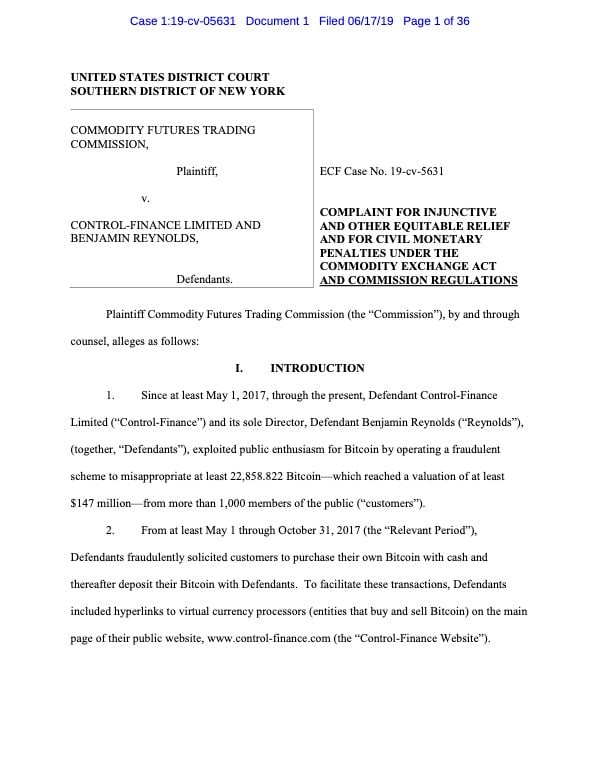The Commodity Futures Trading Commission (CFTC) has filed a civil enforcement action against UK based defendants Control-Finance Limited, a Bitcoin trading and investment company, and principal, Benjamin Reynolds. According to the CFTC, the defendants are charged with “exploiting public enthusiasm for Bitcoin by fraudulently obtaining and misappropriating at least 22,858.822 Bitcoin—worth at least $147 million at the time—from more than 1,000 customers.” The lawsuit was filed in the U.S. District Court for the Southern District of New York.
 While the defendants may have been based in the UK, the CFTC said the fraud targeted and misappropriated funds from customers residing in the District.
While the defendants may have been based in the UK, the CFTC said the fraud targeted and misappropriated funds from customers residing in the District.
The CFTC alleges that since at least May 1 through October 31, 2017, the defendants used a website and accounts at popular social media sites to fraudulently solicit customers to purchase and transfer Bitcoin to them. The defendants encouraged customers to transfer Bitcoin to them by falsely representing that they employed “expert virtual currency traders” earning “guaranteed daily trading profits on all Bitcoin deposits.”
In reality, the defendants made no trades on customers’ behalf at all.
To cover the sham, defendants fabricated weekly “Trade Reports” and posted them to the Control-Finance Website.
Control-Finance and Reynolds, based in Manchester, apparently made numerous material misrepresentations and omissions, including:
- they earned customers 1.5 % in daily Bitcoin trading profits and up to 45% per month;
- used risk diversification methods to protect customers’ Bitcoin deposits;
- provided a “safe haven” from Bitcoin market risks.
After customers deposited Bitcoin into a single-use addresses, the defendants routed the deposits to other, pooled wallet addresses that they created at virtual currency payment processors and exchanges throughout North America, Europe, and Asia. The defendants then moved customers’ Bitcoin into these pooled wallet addresses through transactions that lacked any valid business purpose and were designed solely to conceal misappropriation, according to the CFTC.
The perpetrators of the Ponzi like scheme allegedly used the pilfered Bitcoin for their own personal uses.
On September 10, 2017, the defendants shut everything down and stopped making any payments.
The CFTC states that in an attempt to launder the cyrpto, the defendants routed the majority of their illicit transactions through CoinPayments in Vancouver, Canada.
The CFTC Director of Enforcement James McDonald commented on the enforcement action:
“The CFTC will continue to vigorously police the Bitcoin markets, including fraudulent trading activity as alleged in the Complaint here. Fraud in these markets not only harms customers, but if left unchecked, it could also hinder innovation. We caution potential virtual currency customers, once again, that they should engage in appropriate diligence before purchasing or trading virtual currencies.”
The CFTC, as well as the Securities and Exchange Commission, has communicated their determination to pursue and prosecute fraudsters that target US based individuals regardless of the location of the fraud.
In its continuing litigation, the CFTC seeks civil monetary penalties, restitution, rescission, disgorgement of ill-gotten gains, trading and registration bans, and permanent injunctions against further violations of the federal commodity laws, as charged.
This case is brought in connection with the CFTC Division of Enforcement’s Virtual Currency Task Force.



